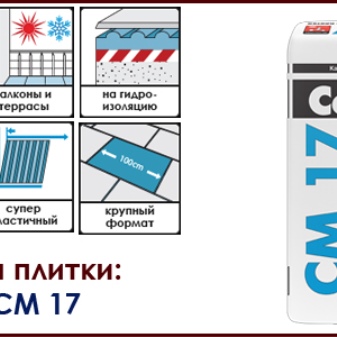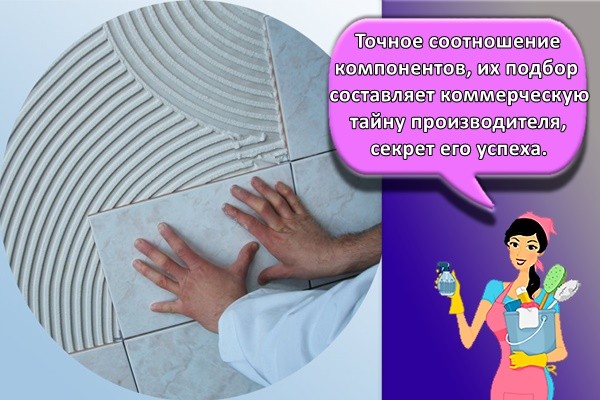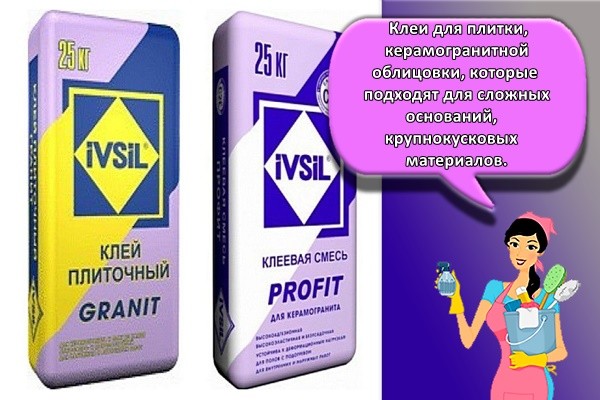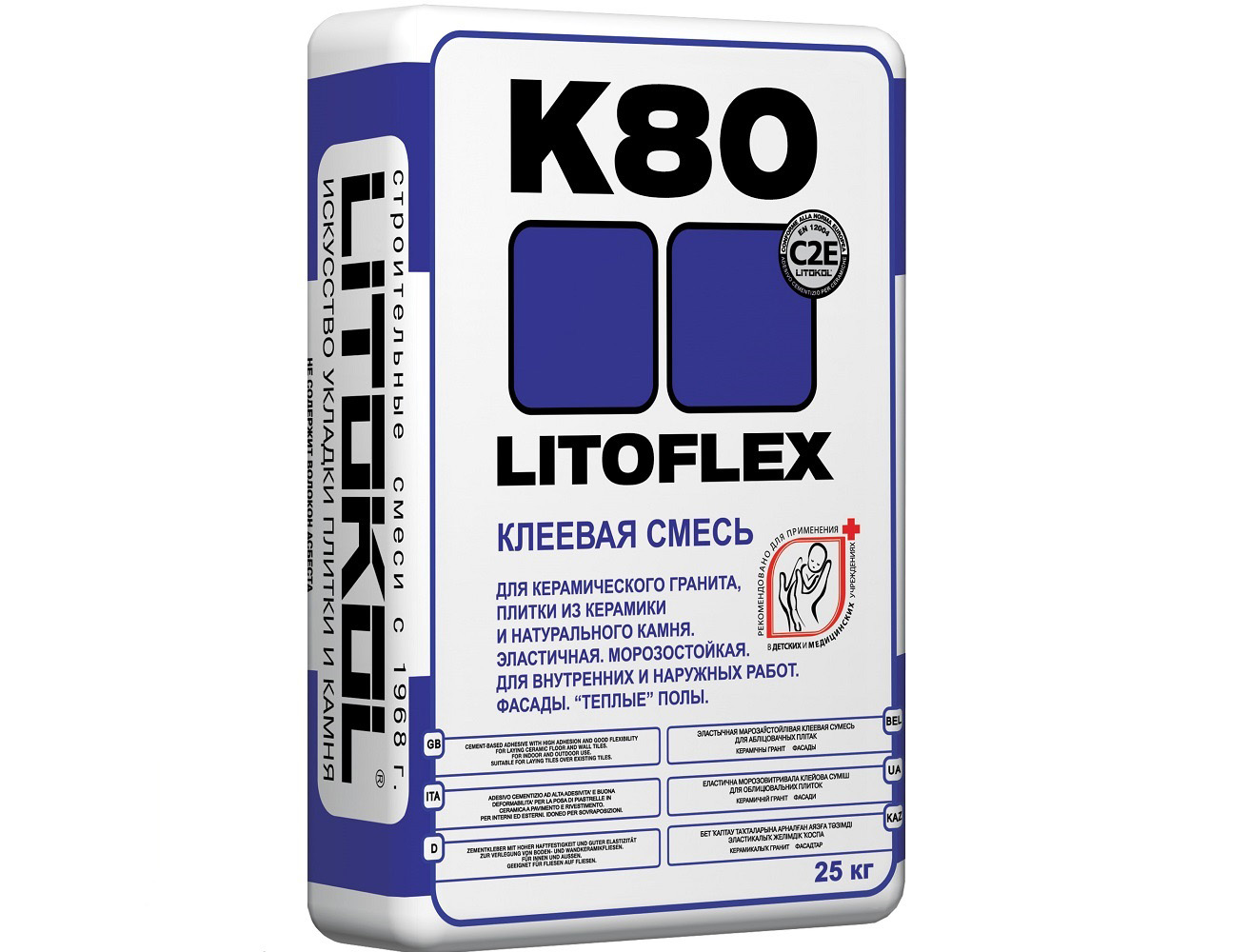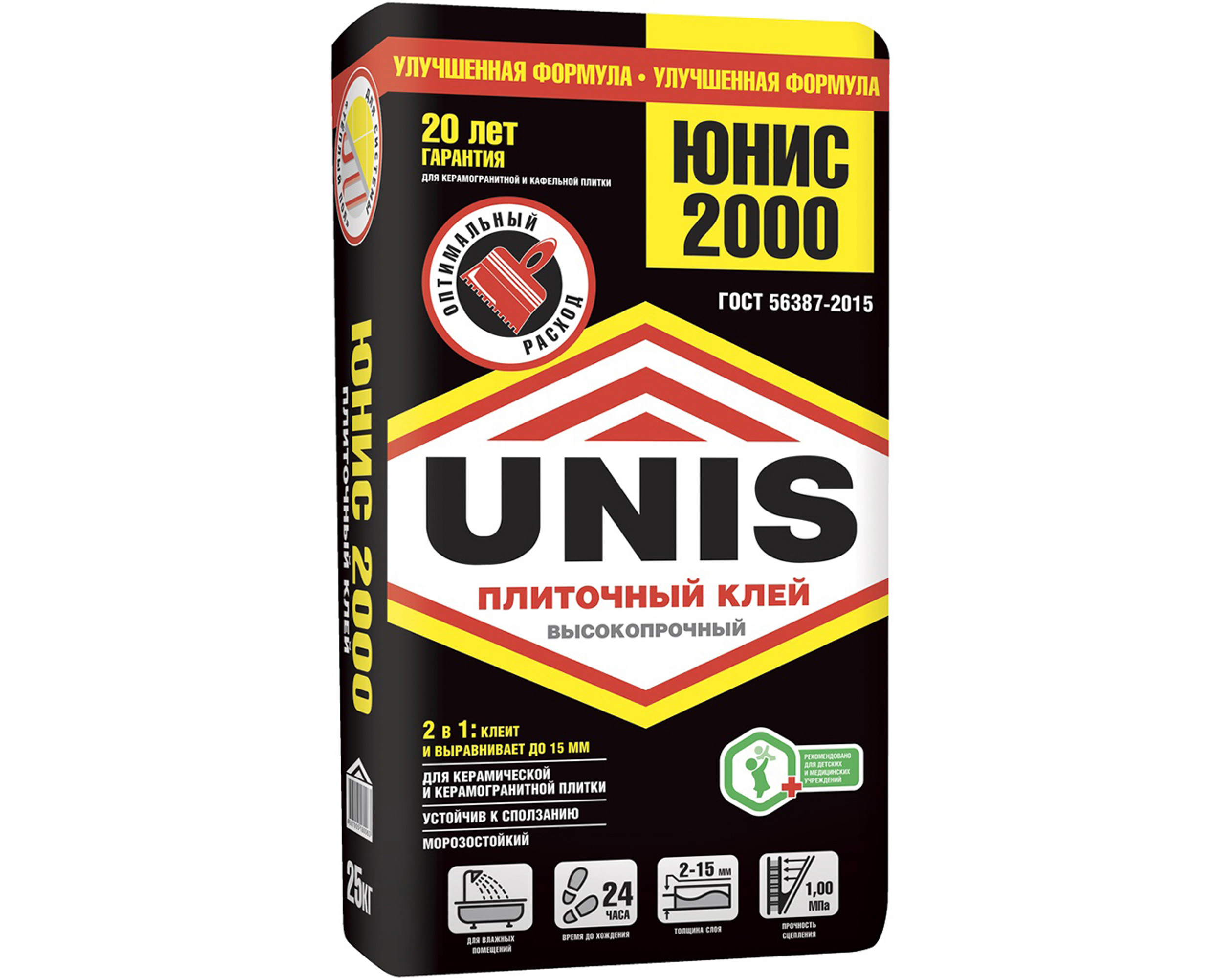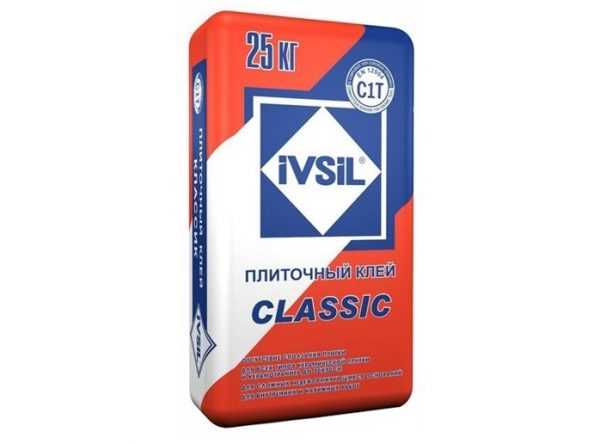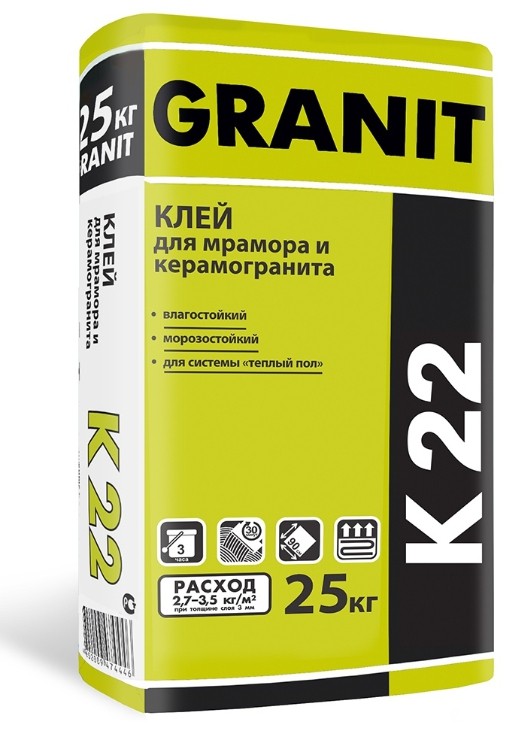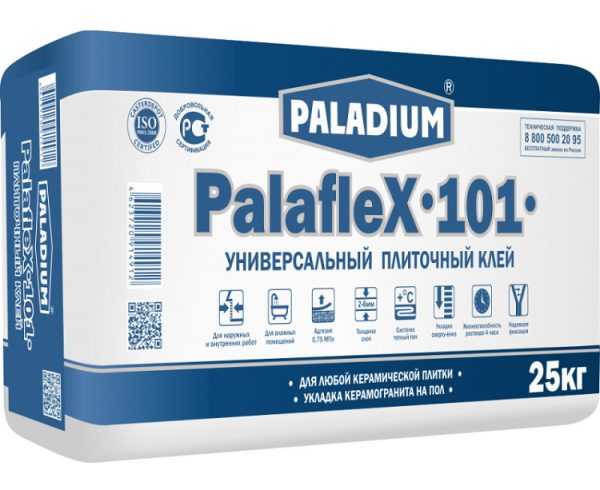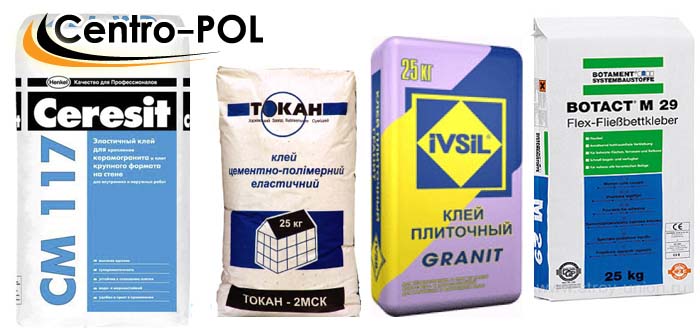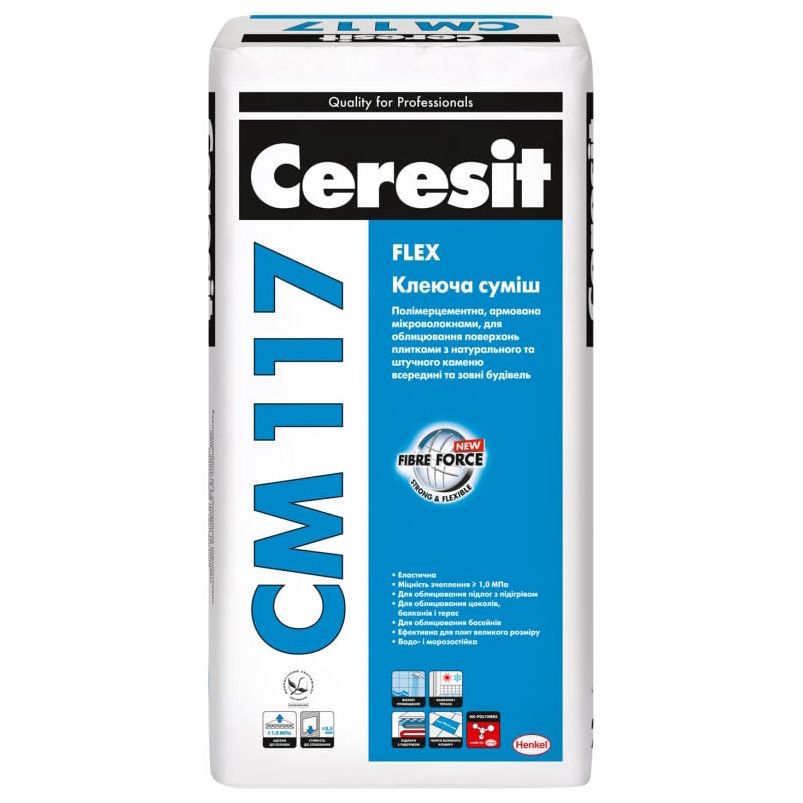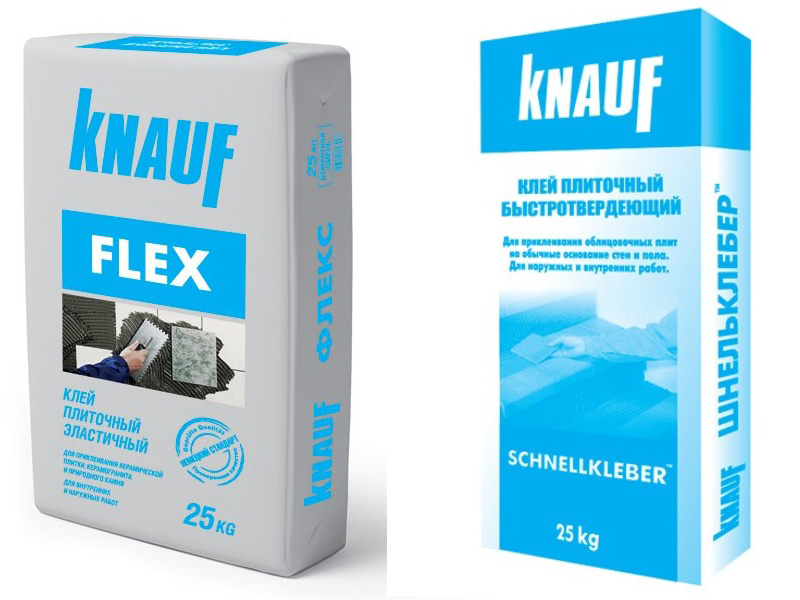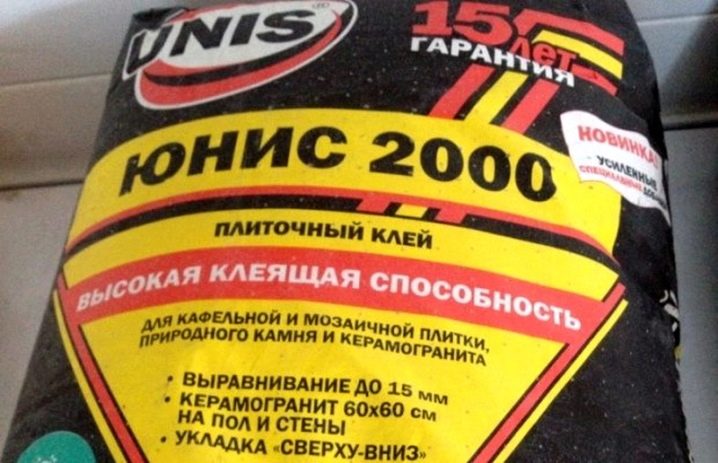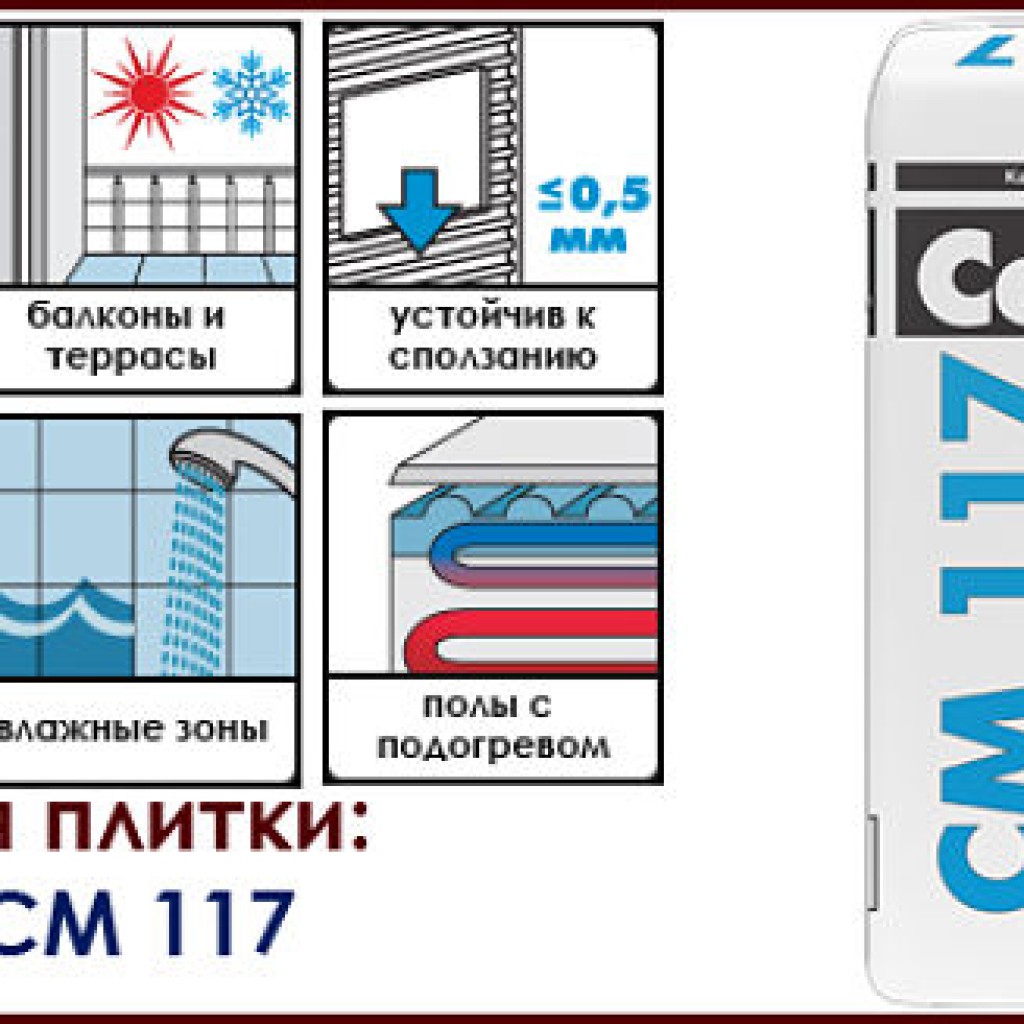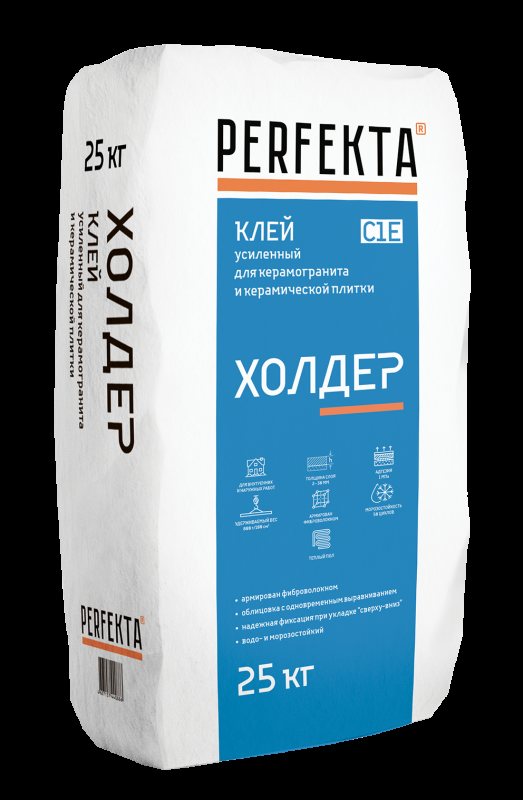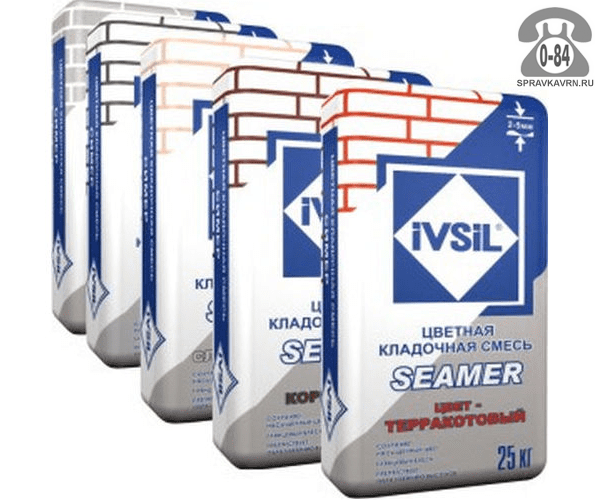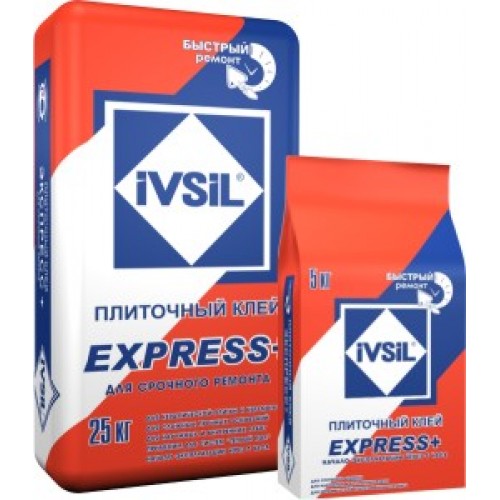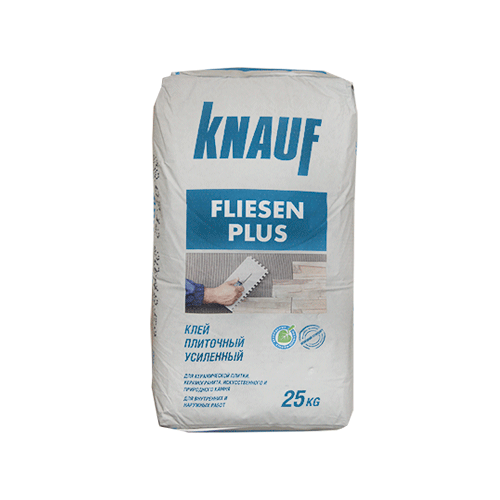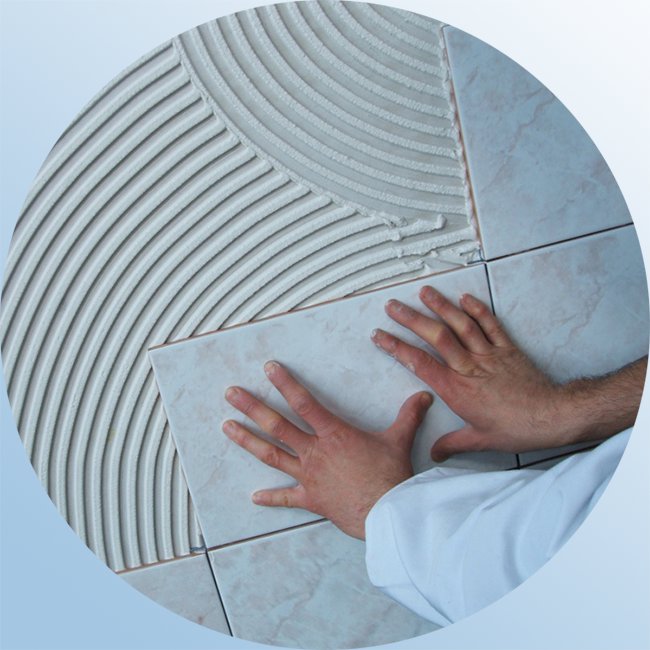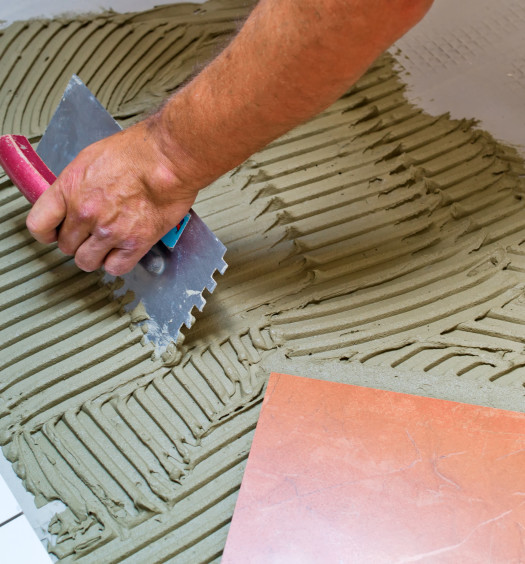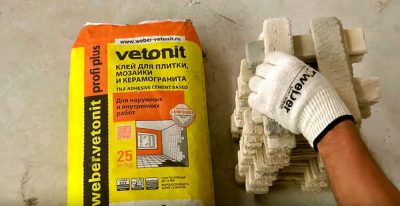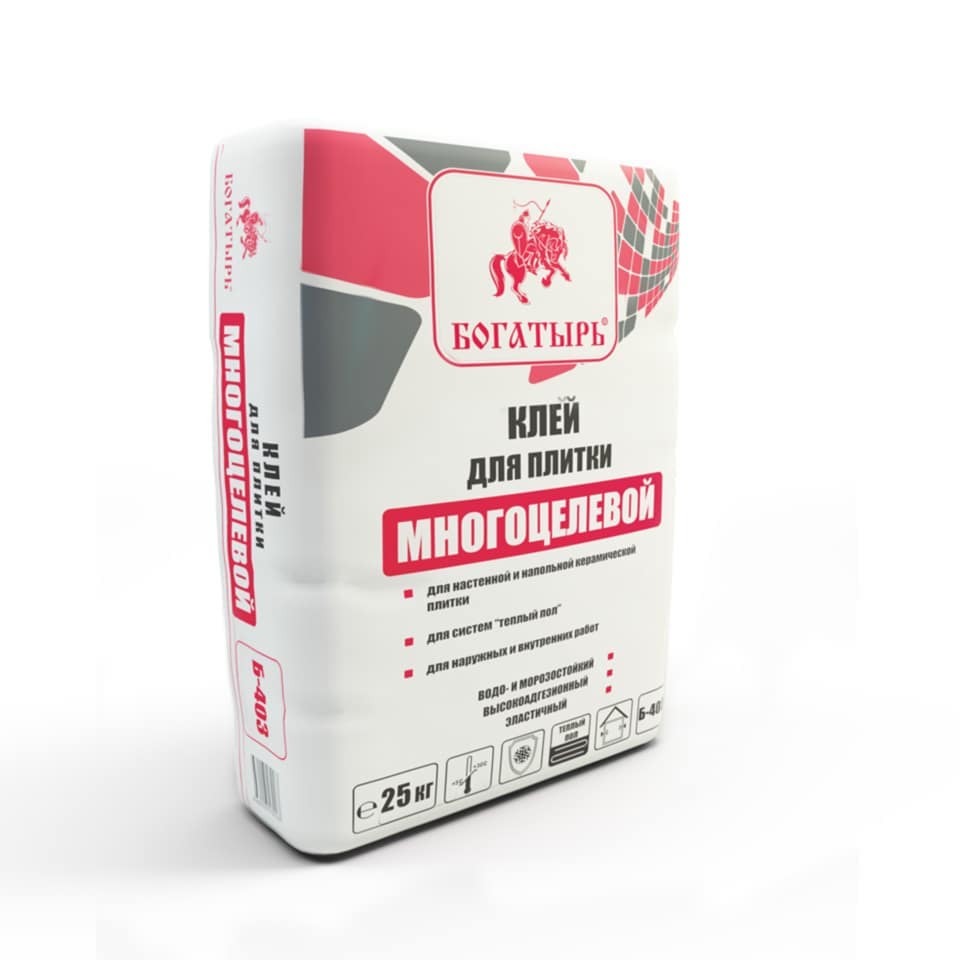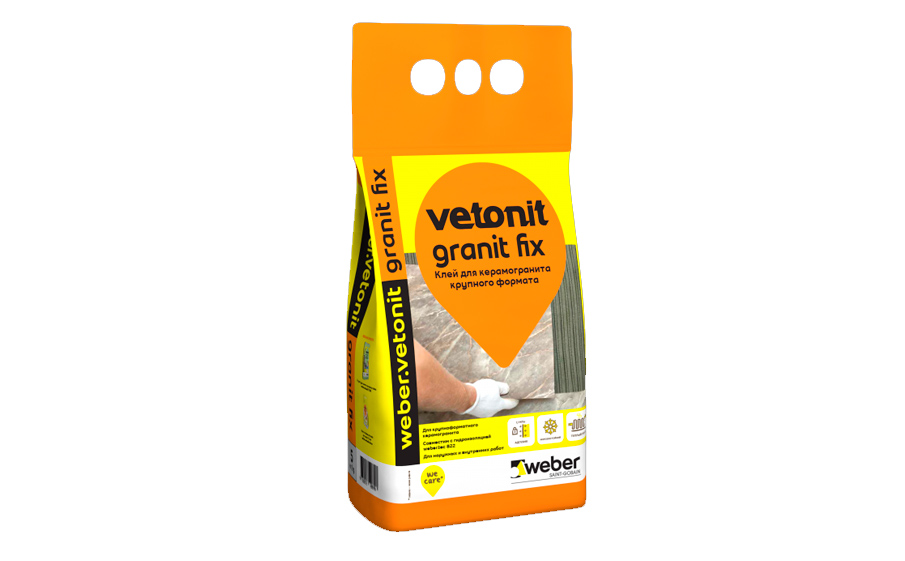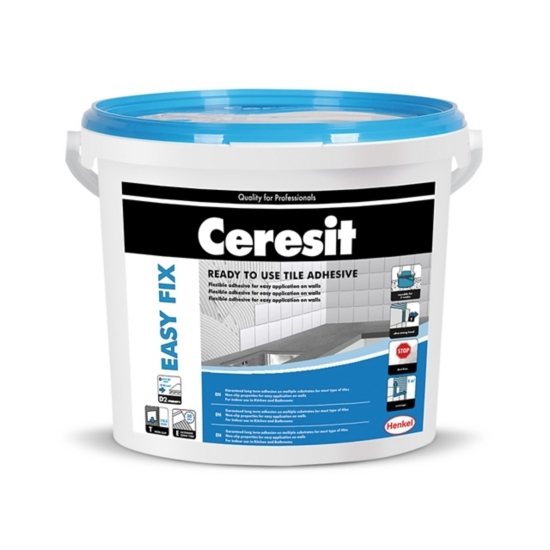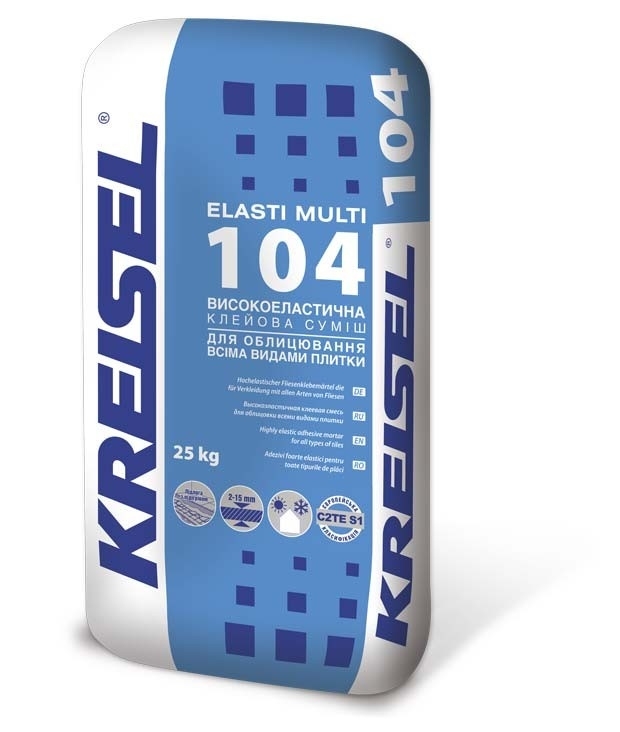Classification of glue by special properties
- Heat resistant
- Frost resistant
- Fast hardening
- Leveling
- Elastic and highly elastic
- Thick layer
- Universal
- With reinforced fixation
Heat resistant
This solution is used for facing stoves, fireplaces and underfloor heating. Must withstand temperatures in excess of 100⁰C. As a rule, prolonged heating up to 175⁰C and short-term heating up to 1200⁰C. That makes it possible to lay ceramics on a stove, fireplace or underfloor heating. In this case, a less heat-resistant solution can be used for lining the chimney.
Heat-resistant tile adhesive is indispensable for facing stoves, fireplaces and underfloor heating.
Frost resistant
As a rule, it is a dispersion mixture. But frost-resistant tile adhesive must withstand not only low temperatures, but also its sudden changes. Therefore, the manufacturer is obliged to indicate on the packaging that the glue is frost-resistant. Moreover, there are mixtures that have both frost resistance and heat resistance at the same time. Which can be used for lining stoves in rooms with irregular use.
The properties of the frost-resistant adhesive make it ideal for laying ceramic tiles.
Fast hardening
This type of tile adhesive hardens in 3-4 hours. That allows you to quickly start operating it. But on the other hand, it is more difficult to work with him, since he grasps in 5-10 minutes. After that, it is no longer possible to mount the materials. Therefore, it must be placed quickly and accurately.
This quick-drying tile adhesive is a great help for people who want to finish their renovation work as soon as possible.
Leveling
This type of mortar is used when laying tiles on an uneven surface with differences of more than 1 cm. Why is it necessary to use cement mixtures. And, of course, this significantly increases the consumption of glue. Therefore, such styling will cost more. Therefore, this is rarely justified in terms of the cost of work. But in some cases it is simply necessary.
Tile leveling adhesive is a mixture of cement, fractional sand and polymers, which give it various properties.
Elastic and highly elastic
The elasticity index of a solution determines its ability to bend under mechanical stress. Thus, two classes of elastic adhesives are distinguished: S1 and S2. S1 assumes the possibility of a deflection of at least 2.5mm. S2 - allows the mixture to bend by more than 4.9mm. Accordingly, S1 is flexible tile adhesive and S2 is highly elastic.
Elastic tile adhesives contain modified additives and plasticizers.
Thick layer
The layer thickness index refers to cement-based mixtures. Since it is these solutions that are used to correct the unevenness of the coating. Thus, for coating defects of no more than 10 mm, a thin-layer mortar is used. When the solution is used not only as a mixture for tiles, but also as a leveler, then a thick-layer mixture is used.
The thick-layer tile adhesive is used for the installation of large-format ceramic, porcelain stoneware or artificial stone floor tiles.
Universal
This type of tile adhesive is suitable for both outdoor and indoor use. But it should be borne in mind that it may not be very reliable when using ceramics larger than 30X30 cm, as well as with temperature drops and high humidity. Therefore, it is better not to put it in the bathroom. And besides, it is not recommended to use it for cladding rooms located in difficult climatic conditions.
For some tile models, a universal adhesive may also work. This applies to models 10x10, 20x20, 30x30 cm.
Reinforced glue
Mixes of reinforced fixing include dispersion, polyurethane and epoxy solutions. As a rule, they are used for wall cladding with large materials. Since such a solution has increased adhesion properties.
The key feature of reinforced tile adhesive is its increased resistance to static and dynamic loads.
With high adhesion, can be used for KNAUF Flizen Plus ceiling tiles

The composition has excellent adhesion and adhesion strength to concrete 0.8 MPa. The solution lives up to 5 hours, the material can be adjusted up to 10 minutes. The seams are rubbed out after 24 hours. Quick-drying composition - dries for 2 days, completely solidifies in 7 days. The substance is resistant to temperature extremes, withstands from -45 to + 80 ° С. Transferred at least 25 freeze cycles.
Universal composition. Before applying KNAUF Flisen Plus requires preparation and cleaning of the surface. It must be dry. The adhesive has increased adhesion. It adheres well to concrete, cement screed, limestone, drywall, brick and other substrates.
Recommended for tiles with a side up to 30 cm and moisture absorption no more than 3%, porcelain stoneware 60x60 cm.It is well recommended as an adhesive for PVC tiles, glass-magnesium sheets, styrofoam, polyurethane, polystyrene, glass wool. Also suitable for the composition of quartz vinyl tiles installed on floors, for ceiling tiles made of light materials (polystyrene, polystyrene), including in bathrooms.
Pros:
- elasticity;
- good adhesion;
- versatility;
- resistance to moisture and temperature extremes;
- different bases;
- suitable for a variety of finishes.
What kind of tiles is the street glue for?
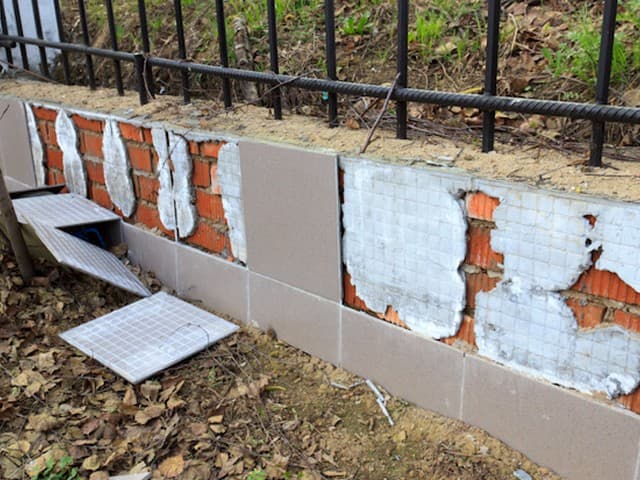 The result of a wrong tile selection
The result of a wrong tile selection
For anyone. Since the frost-resistant adhesive is "reinforced", it is able to withstand all types of tiles - from ordinary tiles to heavy porcelain stoneware.
But not all types of tiles will withstand the conditions of the street ... This, just in time for the issue of tile destruction.
You can often come across a picture of cracked or collapsed tiles, the base or parts of which continue to "show off" on the mounting surface, unpleasantly spoiling the overall appearance of the building.
This is due to the wrong type of tile - porous "light" ceramic is not at all suitable for outdoor conditions. Even good frost-resistant glue will not "keep" them from destruction, because due to the temperature drop, water will first penetrate into the holes (pores) of the tile, and then freeze there, gradually destroying the tile.
Therefore, for outdoor work, it is so important to choose the right not only glue, but also frost-resistant tiles. But its size and weight are not of fundamental importance - reinforced street glue is able to withstand even the heaviest slabs of porcelain stoneware
But its size and weight are not of fundamental importance - reinforced street glue is able to withstand even the heaviest slabs of porcelain stoneware.
Popular adhesives
You can glue mosaics or tiles in the pool with domestic or imported compounds. The most popular are the adhesives of the Ceresit company. Here are the most famous ones:
- for ceramic tiles - Ceresit CM-16, CM-17 and CM-117, as well as "Yunis Pool";
- for marble, glass mosaics - IVSIL MOSAIK, Ceresit CM-115;
- for glazed clinker tiles - IVSIL AQUA, Ceresit CM-117;
- for porcelain stoneware - "Eunice Basin", "Osnovit Maxiplix T-16".

Other brands of adhesives worth choosing include:
- Farvest Pool C2TE25. A finely dispersed cement and sand based product suitable for fixing ceramics and any type of mosaic, natural and artificial stone. Differs in high frost resistance - up to 50 cycles, excellent plasticity, water resistance.The glue is operated at temperatures from -50 to +60 degrees.
- "Pool TM-16 wins". A dry mixture of quartz sand and cement with the addition of special modifiers. If it is necessary to glue mosaics or tiles on flexible plastic bases, add Tverdolit ElastoCem instead of water to the mass.
- PCI Nanolight. Highly elastic adhesive in the form of dry mass, produced in two colors (available in white and gray). Differs in absolute inertness to chemicals, salts, as well as the highest water resistance.
- PCI Collastic. Polyurethane ready-to-use compound that does not require preliminary priming. It is allowed to grind the seams already 6 hours after gluing the tiles. Due to its elasticity, the composition neutralizes the stress of the tile and protects the surface from deformation.

Work with these adhesives should be carried out at a temperature of + 5 ... + 30 degrees and humidity up to 75%.
What to look for when choosing an IPC?
After hardening, frost-resistant glue should have maximum resistance to high humidity and low temperatures. These properties are of primary interest to consumers. They are provided by what quality antifreeze additive is the main one in the mixture. If its efficiency is at a low level, there is no reason to hope for the frost resistance of the IPC, as you yourself understand.

Frost resistant glue
You should also pay attention to the content of special fillers and minerals in the dry mix for bonding. There should be about 40 percent of them.
Experts strongly advise buying IPCs, which belong to the group of one-component. This means that the composition will need to be diluted in certain proportions with water only, no other additional mixtures will be required.
In addition, it is desirable to pay attention to the following additional properties possessed by the adhesive. Feel free to buy a composition if it provides:
- absorption of the sound of footsteps and a decrease in sound conductivity;
- fast hardening;
- compensation of unevenness of the surface on which the tiles are mounted;
- a decrease in stress between the base and the material laid on it (the value of the elasticity of the composition is responsible for this characteristic - the higher it is, the better);
- a high degree of waterproofing without the use of any other compounds.

Frost-resistant dry mix
Never purchase dry mixes with clearly visible dirt, foreign additives, lumps that impair the homogeneity of the glue. The composition should be pure white or another shade specified by the manufacturer.
Be sure to read the instructions for the IPC. It clearly indicates for which types of surfaces the mixture is suitable. In most cases, a universal frost-resistant composition is suitable for cement screeds and surfaces, aerated concrete and their varieties, where there are light additives, gypsum plasters, lime-cement bases. If there are any restrictions on the use of the adhesive mixture, they are always indicated in the instructions.
Main features and composition of frost-resistant glue
Modern frost-resistant binders are optimal for any outdoor work, whether it is facing foundations or facades of tasks or laying tiles. In such adhesives there are special anti-freeze additives that provide a unique resistance of the connection to temperature extremes. Any IPC has a special composition that guarantees the most durable fixing of the mixture to the base, protection of glued products from delamination and deformation.
Frost resistant adhesives are recommended for cement, brick and concrete substrates. With their help, you can easily make a reliable installation of porcelain stoneware and ceramics, as they say "for centuries." Some mixtures also allow the installation of anhydrite and self-leveling floor coverings.Note that outdoor work using IPC is allowed to be performed at subzero temperatures (depending on the specific brand of the binder mixture - up to -80 ° C).
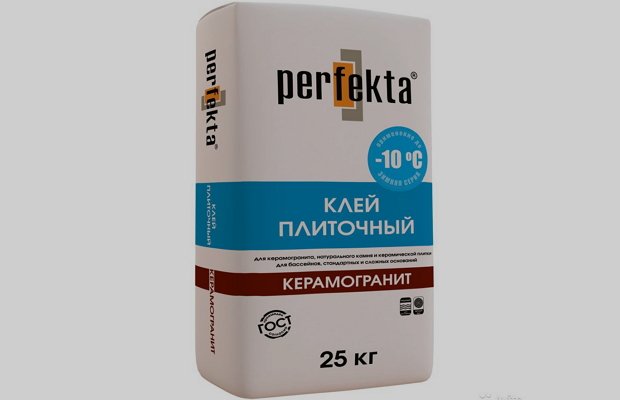
Frost-resistant glue for laying porcelain stoneware
The main components of a standard frost resistant adhesive are usually:
- Cellulose ethers. They are added to adhesives in order to obtain the ideal mixture viscosity.
- Fillers. Such components are understood as crushed dolomite, limestone, quartz sand with very fine grain parameters.
- Organic and mineral compounds that provide the strength of solutions prepared from dry IPC. Such compounds are usually understood to mean Portland cement and slaked lime. They are important, it depends on these compounds how moisture-resistant, elastic and frost-resistant the ready-made mixture for facing and installation work will be.
- Dispersions of (aqueous) polymers that are pre-dried. Otherwise, these substances are called polymer redispersible powders. They are necessary so that when the dry mixture is mixed with water, all the components of the glue can restore their initial physical state.
- Polystyrene additives, as well as aluminum, calcium, magnesium. These elements form a solid structure for the IPC. They increase the effectiveness of the use of mixtures and have the same importance for its quality as the anti-freeze additives themselves.
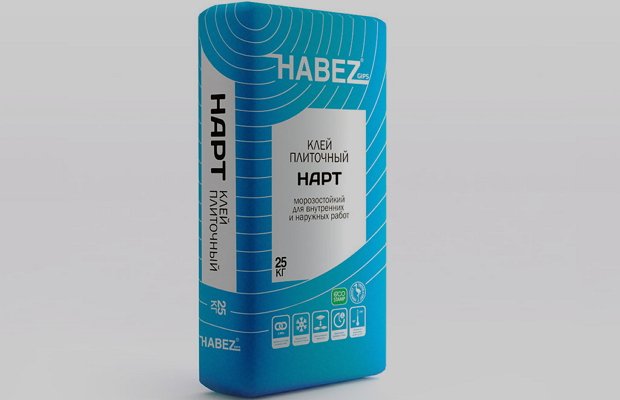
Tile adhesive with anti-freeze additives
Also considered adhesives may include a variety of water repellents, defoamers, plasticizers and thickeners. Each manufacturer is now developing their own formulas using truly effective anti-freeze additives that are responsible for the quality of the finished product.
Features of installation of porcelain stoneware
Excellent performance does not make porcelain stoneware tiles forever. And here a lot depends on the correct installation and related materials, as well as the quality of fixing the product.
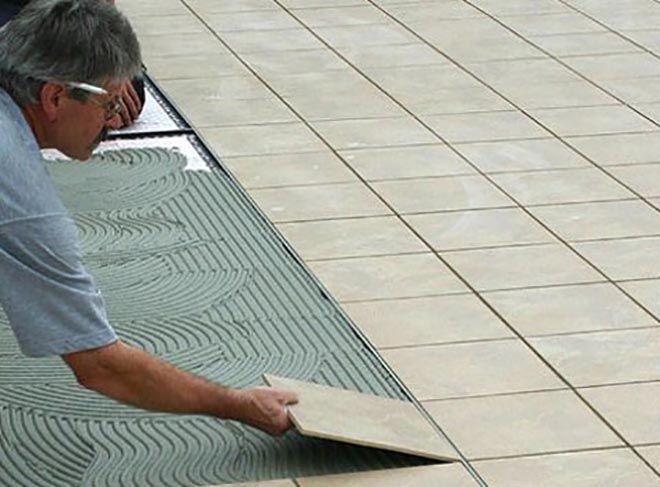
When laying porcelain stoneware, the first step is to prepare the base. The area must be clean, free of debris and with devices that will provide moisture drainage. Experts recommend preparing a concrete screed for better mating and long-term operation, for which you need to use high-quality cement, as well as reinforcement and a primer on an already fixed surface.
It is important to correctly select the adhesive composition, which will be attached to the tiles for the street. Choose the adhesive that says - for porcelain stoneware
You should focus on a product intended for outdoor use, capable of withstanding temperature changes, various humidity conditions and heavy loads. Manufacturers provide that a special composition for porcelain stoneware is able to withstand low temperatures down to -150 degrees.
When choosing an adhesive, you need to focus not only on lowering the temperature regime, but also on increasing it. Therefore, you should select the composition that is able to withstand a wide range of differences, for example, from -80оС to + 80оС. In addition, the glue must have:
- special additives to increase the adhesive ability;
- adhesion strength to the surface in the range from 0.6 MPa to 1 MPa, depending on the weight of one porcelain stoneware tile;
- resistance to a significant drop in temperature, which is denoted by the letter F and has values from 15 to 100, the ideal option is F50.
Do not forget about the ratio of the amount of glue to the area for installation and the thickness of the tiles. To carry out accurate calculations, it is better to turn to a specialist, especially if the selected outdoor porcelain stoneware is in front of his eyes. For those who are used to relying on their own strength, you can take as a basis approximate calculations, where with a layer of glue of 2-5 mm, the approximate consumption per 1 m2 will be 2-5 kg of solution.
The next on the list of materials for laying outdoor porcelain stoneware is a trowel agent or mixture. With the help of grout, you can refine the joints between the styling fragments, although it does more than just a decorative function. The presence of a high-quality mashing solution prevents moisture from entering between the tiles.
Only the grout should be chosen according to the classification equal to the adhesive composition and finishing porcelain stoneware. If the material is frost-resistant, then the mixture must have the appropriate properties. Otherwise, the entire installation procedure can go down the drain due to stupid savings on the quality of the grout.
Adhesive selection
The range of tile adhesives is large, but few are suitable for use in the pool. Waterproof mixtures come in the form of a ready-made solution and dry powder. The cost of the latter is lower when compared in terms of consumption. The main ingredient in them is cement, which is packed in bags, packages.
The solutions have an epoxy, latex, acrylic, polyurethane base, which are poured into cans and buckets.
When choosing products, aesthetic indicators are taken into account. They are low for compositions on cement, but where beauty is not very important, such means are suitable. If the owner follows the design, it is better to use a ready-made mixture. In this case, a predominantly white color is chosen.
Matching the pool bowl
The choice of glue is strongly influenced by the material of the base of the bowl. One of the main indicators is the degree of adhesion.
If ceramic tiles are used, compounds are used whose adhesion to the surface exceeds 1 MPa.
Concrete, stone and brick bowls are easy to lay. They have a rough surface, excellent adhesion to it, the tiles are securely fixed. Inexpensive dry mixes on a cement basis cope with the lining of such surfaces.
For the manufacture of pools, polymeric materials are often used. They have a beautiful smooth surface that does good waterproofing and decorative functions.
It happens that the owners want to improve the design by gluing the tiles. Adhesion to plastic is provided only by polyurethane glue or epoxy resin.
Dependence on the operating mode
For the construction of summer pools, frost-resistant mixtures are used. For the winter, the water is drained, but the tiles and seams freeze.
If you use a waterproof glue designed for freezing temperatures, it will not withstand extreme conditions.
To make the composition frost-resistant, special additives are mixed into it. When the glue cures, a structure is formed that does not react to frost by expansion. The demanded brand of frost-resistant mixture is Ivsil Aqua on a cement-sand base with polymers.
Adhesive and water treatment systems
Pools used by many people are often disinfected and disinfected with chlorine. It is a harsh chemical that can react with glue and destroy it. To prevent this from happening, formulations that are resistant to chlorine are used.
Professionals use Ardex X 77 - highly elastic, hardens quickly, which is facilitated by fiber reinforcement and Ardex E 90 additive.
Varieties of glue by composition
- Cement based
- Epoxy
- Dispersive
Cement based
The simplest and cheapest tile mix. The composition of which includes 3 components: sand, cement and polymer additives. All three elements influence the qualities of moisture resistance, adhesion and plasticity. But it is polymer additives that affect the elasticity of the material.
 Cement-based glue is a classic of the genre.
Cement-based glue is a classic of the genre.
Epoxy adhesive
This mixture is recommended for use on smooth surfaces. Contains liquid epoxy resin and catalyst. From which there are two main disadvantages of epoxy mortar:
- It is difficult to work with him due to the need to strictly observe the proportions when mixing the ingredients.For this, you should strictly adhere to the instructions indicated on the packaging by the manufacturer.
- Epoxy grout can crystallize in frost. Therefore, its use when facing the facade of a house is not recommended.
 Epoxy adhesive is excellent for bathroom tiles and is recommended for swimming pools.
Epoxy adhesive is excellent for bathroom tiles and is recommended for swimming pools.
Advantages:
- It has a good spreading rate, due to which it provides reliable adhesion of materials. That is, this solution is very plastic.
- Moisture resistant - that's why epoxy glue is often used in bathrooms.
- Does not shrink and crack.
Dispersion adhesive
Used when working with any surfaces and materials. As a rule, it is used for facade cladding. Because it is able to withstand heavier materials due to its ability to better bond materials
It is very important that the dispersion mixture is sold immediately ready-made. Which is very convenient! But on the other hand, its price is noticeably higher even in comparison with epoxy mortar.
 Less costly than its epoxy-based counterpart.
Less costly than its epoxy-based counterpart.
Separately, it is worth highlighting water ‒ dispersion solutions (polymer) capable of forming a waterproof shell. Due to this, they have a lot of advantages: from environmental friendliness to high moisture resistance and heat resistance. But, firstly, they are expensive, and, secondly, they cannot be used to level the surface. Therefore, they can only be applied to flat walls or floors.
Several options for using porcelain stoneware for the street
You can decorate various areas with ceramic tiles. And for the street, porcelain stoneware, and even well-chosen, has a wider range of applications, since it is used to decorate garage buildings, summer verandas and terraces. The most common applications are:
Entrance area

The anti-slip surface of the tile with a beautiful wood or stone pattern will add a zest to any interior. And the roughness of porcelain stoneware will allow you to abandon door mats, which will make the entrance more modern.
Steps

For these purposes, a ready-made tile, cut to size, is used. It has special non-slip stripes, and instead of a cut line, the end has an attractive look.
Tracks
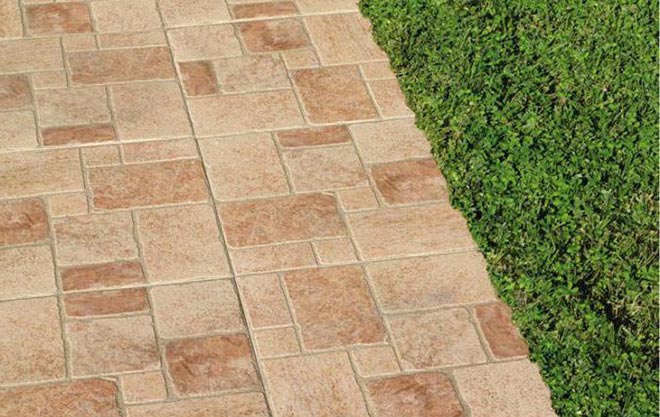
Frost-resistant porcelain stoneware is best suited for laying paths. Only during installation should the technology and all recommendations for the use of special glue and grouting solutions be carefully observed. Forming the path, you can show all the possibilities of your own imagination, deviating from the standard form and decorating the site in the original style.
Terraces and verandas
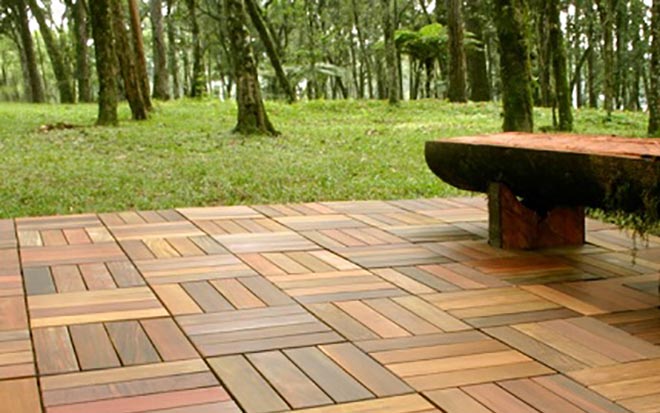
Open terraces and verandas, which in modern houses are some kind of transition between the street and the house. Such rooms are decorated more in a street style and materials are selected accordingly. Laminate and linoleum will not last long, but floor porcelain tiles are just right. It is recommended to select the same views as when entering the house. Only experts advise using adjustable supports during installation.
Garage and sauna
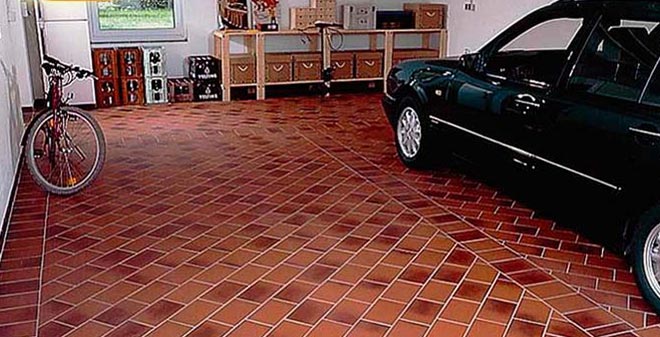
Given the long service life, you can use porcelain stoneware for the floor in the bath and garage. The peculiarities of using these premises are that they are characterized by a temperature drop and various man-made influences. In the bath, it is boiling water, steam, after which the cold regime often sets in for several days. And in the garage there is a mass of lubricants and other substances that have a destructive effect. The properties of porcelain stoneware will allow you to maintain the integrity of the surface and a decent appearance for a long time.
For laying on the floor, as well as on the wall of stone and mosaic Ceresit CM 115

White compound for fixing marble, natural stone, including light shades, as well as glass mosaic paintings on the wall and floor. It is better to work with it for specialist tilers, the solution dries quickly.The ready-made mortar dries up after 2 hours, the lining can be corrected in a maximum of 25 minutes after laying. The time of mashing the seams is after 1 day. The adhesion force to the surface is 0.8 MPa.
The glue has the C1T brand, which determines its domestic use. It is impossible to use it for arranging floors where many people walk. It is not suitable for offices, public buildings; for such places it is worth choosing the C2 brand. Thin-layer, the recommended layer is up to 5 mm, in rare cases up to 10 mm is possible, but this is not desirable.
Resistant to water and frost, can be glued to a heated screed, environmentally friendly. The best glue for decorating baths, for tiles in the bathroom. You can glue the trim on a plaster base or lay plaster tiles.
Ceresit CM 115 is suitable for outdoor stairs, floors of balconies, terraces, for finishing swimming pools, wet and dry rooms in the house.
Pros:
- White;
- for light natural stone and mosaics;
- suitable for plaster;
- elastic;
- not afraid of water, frost;
- suitable for heated surfaces;
- durable.
The best moisture resistant tile adhesive
It is a special adhesive for installing tiles in bathrooms and stairs. It contains a hydrophobic modifier, which makes it possible to cover even fountains and swimming pools.
Litokol Litoelastic
5.0
★★★★★
editorial estimate
100%
buyers recommend this product
See overview
It is a reactive epoxy-polyurethane adhesive that does not require water to make. You only need to mix two of its components.
The agent is used for external and internal cladding of vertical and horizontal surfaces with natural stone and ceramic tiles.
Advantages:
- High adhesion;
- Frost resistance;
- Not susceptible to cracking;
- No drying shrinkage;
- Resistant to deformation.
Disadvantages:
High price - from 3000 rubles per 4 kg bucket.
Litokol Litoelastic will even glue mosaics and tiles to metal substrates. The glue is super reliable and versatile in its own way, but very expensive.
Knauf flex
4.9
★★★★★
editorial estimate
96%
buyers recommend this product
This adhesive is intended for areas of high stress, as well as for lining swimming pool bowls. The solution remains viable for 3 hours. Open time is 20 minutes, there is 10 minutes for tile adjustment.
Advantages:
- Resistant to serious dynamic loads;
- Compatible with substrates that do not absorb water;
- Water-, frost-, heat-resistant;
- Retains elasticity after hardening;
- Does not get dusty when working;
- The widest operating temperature range (-50 .. + 80 ° С).
Disadvantages:
Increased consumption.
This adhesive is used for vertical and horizontal surfaces without restrictions on the size and weight of the tiles to be laid.
Weber.Vetonit Easy Fix
4.8
★★★★★
editorial estimate
89%
buyers recommend this product
This adhesive has a cementitious base which gives a gray color. You can work with the ready-made solution for about two hours at a temperature of +5 .. + 35 degrees. For 1 sq. m. it takes about 3 kg of dry product.
Time of open use and correction of tiles - no more than 15 minutes. The composition is water-resistant, but it cannot be used for underfloor heating and other high-temperature surfaces.
Advantages:
- Adhesion over 1 MPa;
- Suitable for outdoor work;
- Frost resistance;
- No tile slippage;
- Reliable fastening.
Disadvantages:
Cannot be used with primers containing quartz sand.
This adhesive can be used for laying mosaics, as well as for indoor and outdoor installation of tiles.
Unis "Pool Hydro"
4.8
★★★★★
editorial estimate
87%
buyers recommend this product
The composition is designed for laying tiles no larger than 60x60 cm in water tanks. It is also suitable for natural stone and mosaics. With it, you can lay tiles according to the "top-down" method.
The glue is frost-resistant and, after drying, can be used at temperatures from -50 to +70 ° C.
You can work with the solution at temperatures from +5 to +30 ° C, and its pot life is 180 minutes.
Advantages:
- Used both indoors and outdoors;
- Applicable for underfloor heating;
- Time for laying and adjusting tiles - 20 minutes;
- Strong adhesion (1.3 MPa);
- Can be used on difficult substrates.
Disadvantages:
Operation in contact with water and negative temperatures is possible only after 28 days.
It is a multipurpose compound used for areas with difficult operating conditions. However, he needs to be given enough time to build strength.
Prospectors "Lux"
4.7
★★★★★
editorial estimate
84%
buyers recommend this product
See overview
The adhesive is intended for ceramic and clinker tiles, porcelain stoneware, as well as artificial and natural stone. It is used in unheated and damp rooms, as well as outdoors.
Suitable for laying tiles in water tanks. No more than 15 minutes are allowed for correction, and the open time is 20 minutes.
Advantages:
- Suitable for underfloor heating (temperature resistance up to +70 ° C);
- Can be laid on old tiles;
- The pot life of the solution is at least 4 hours;
- Frost resistance;
- The plasticity of the solution.
Disadvantages:
The size of the tiles used should not exceed 40x40 cm.
It is convenient to work with this tool - it does not slip and is easy to apply. However, exceeding the recommended layer of 3-5 mm can lead to shrinkage of the tiles.
Manufacturer rating: which is better
You shouldn't buy glue from an unverified manufacturer. Nice packaging and low price are not indicators of quality. Most of the well-known brands have been on the markets for a long time, they have only positive customer reviews:
Ceresit produces the best compositions for laying porcelain stoneware on the wall, floor. The company provides for the division of compositions depending on the size of the tiles. So, CM 14 is universal, serves for laying tiles up to 45 cm, and CM 12 for large tiles up to 65 cm. The prepared solution is flexible consistency, which prevents tiles from sliding off a vertical surface.
Weber Vetonit Easy Fix is an excellent option for laying porcelain stoneware tiles on drywall. Without preparing the foundation itself. The mixture is inherent in moisture resistance, frost resistance. Works are carried out indoors, outdoors. Suitable for gluing boards to all heavy substrates.
Unis granite is suitable for outdoor use of large slabs. Indoors, it is suitable for the "warm floor" system. Resistant to temperature extremes, while the properties remain of their original quality.
It is difficult to say definitely which one is better. German manufacturers Knauf and Ceresit are in the lead in terms of reviews and the number of purchases.

